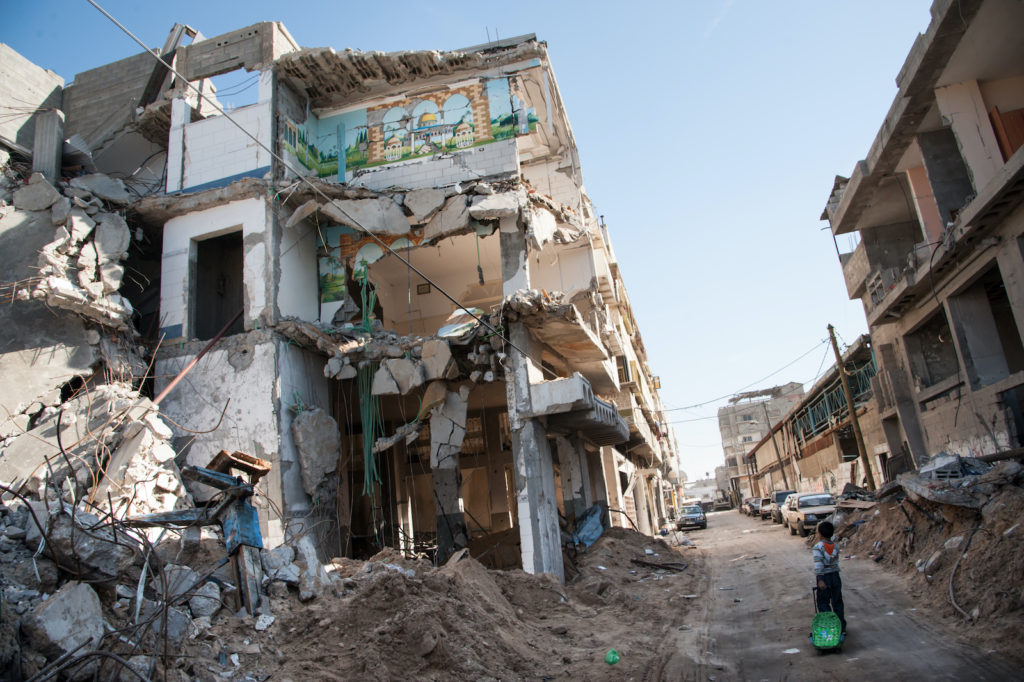IN THE MEDIA
Provocation and retaliation at heart of Gaza war
May 18, 2021 | Jamie Hyams

An edited version of this article was published in the Daily Telegraph – 18 May 2021
We feel we’ve seen this all before from Israel and Hamas. As they lob claims and counter-claims at each other almost as often as rockets and air raids, it can be hard to make sense of what’s behind it.
Mostly, it is Palestinian factions, especially Hamas, using violence to provoke an Israeli reaction, and then using that reaction as an excuse for escalating the violence. Against a backdrop of low-level unrest, including Palestinian youths filming themselves attacking Jews and showing it on TikTok, Palestinian worshippers in the al-Aqsa Mosque compound on Jerusalem’s Temple Mount attacked Israeli police, who defended themselves.
The claimed motivation was a decades-long legal case, nearing its end, where Jewish landowners in the Sheikh Jarrah neighbourhood in east Jerusalem are trying to evict Palestinians who live on their land. The Palestinians had been granted protected tenancy, but have been refusing to pay the minimal rent required.
The Temple Mount confrontation involved Palestinian worshippers arming themselves with rocks, firecrackers and firebombs and, after services, attacking the police as well as Jews worshipping at the Western Wall, which is below the Temple Mount.
Israeli forces responded with riot suppression measures, and hundreds were injured. The Palestinians portrayed this as Israel attacking innocent worshippers and exploited video of stun grenades accidentally entering the open doors of the Al-Aqsa Mosque itself to claim Israel had deliberately “attacked” that holy place.
Hamas and other terror groups in Gaza then used this as a pretext to indiscriminately launch barrages of rockets at Israeli civilians. When Israel, which has no choice but to defend its citizens, responded with air raids targeting terrorists and their military infrastructure, Hamas used that in turn as a pretext to launch hundreds more rockets, which have killed and injured Israelis. Israel responded with further targeted air raids.
Hamas claims that Israel’s strikes have killed many civilians in Gaza, including children. However, it is hard to trust a terror group that hides its fighters and rockets behind its own civilians (in previous wars, it has hidden its military headquarters in a hospital basement and rocket launchers in schools) while targeting Israeli civilians, and uses the accidental and tragic deaths of its own civilians, which Israel tries hard to avoid, for propaganda. Approximately one-fourth of Hamas rockets fall within Gaza, and there is strong evidence that at least some of the Gazan children tragically killed were victims of these.
Israel has hit some significant buildings in Gaza, but only those that are part of the Hamas war effort, and, unlike other armies, warns civilians when it is about to destroy buildings, giving them, and the Hamas operative hiding among them, time to flee.
So what’s motivating this? Palestinian President Mahmoud Abbas, now in the 16th year of what was meant to be a four year term, had finally called elections, and then postponed them. Now, both his Fatah party and Hamas are trying to gain political popularity by portraying themselves as the defenders of Jerusalem.
Also, it appeared that an Israeli Arab party would play a major part in the political manoeuvrings to form a government following Israel’s own recent elections, while Israel’s relations with some of its Arab neighbours have been rapidly improving, through the Abraham Accords. Both of these developments are anathema to Hamas, which wants to see Israel remain isolated, and seeks to achieve this through footage of Israelis killing Arabs.
At the heart of it all is the refusal by Hamas, and its sponsor Iran, which has also been involved in the incitement, to accept Israel’s right to exist. As long as the international community and media continue to allow Hamas to try to achieve its aims through violence, these bloody episodes are likely to continue.
Australia’s Jewish population is also affected by the conflict. Most have family or close friends in Israel, many of whom are spending their days and sleepless nights running into bomb shelters, and fearing the inter-communal violence this conflict has unleashed.
And while we have great sympathy for the innocent civilians trapped in Gaza, it’s also hard not to get incredibly frustrated at the ongoing deluge of media, both traditional and social, that depicts Israel as the villain, or sees the sides as equally to blame, ignoring the true context and the evil of Hamas.
At AIJAC, we see our role as providing important information that may not be readily available, and to try to correct common misperceptions. All we want is for Israel to be treated the same way any other country would be in this situation.
Jamie Hyams is a senior policy analyst at the Australia/Israel & Jewish Affairs Council (AIJAC).
Tags: Gaza, Hamas, Israel, Palestinians





